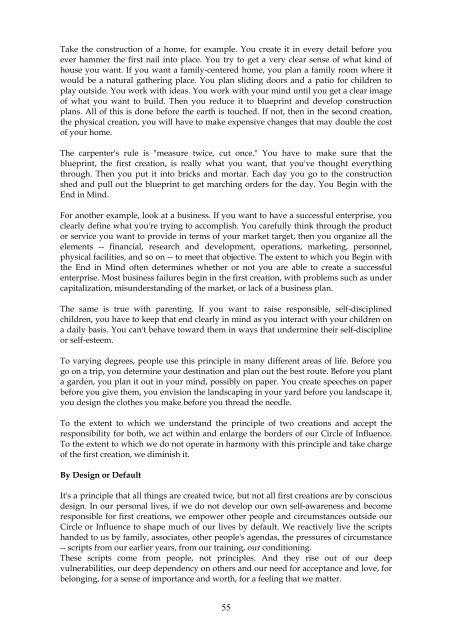Covey - The 7 habits of highly effective people
Create successful ePaper yourself
Turn your PDF publications into a flip-book with our unique Google optimized e-Paper software.
Take the construction <strong>of</strong> a home, for example. You create it in every detail before you<br />
ever hammer the first nail into place. You try to get a very clear sense <strong>of</strong> what kind <strong>of</strong><br />
house you want. If you want a family-centered home, you plan a family room where it<br />
would be a natural gathering place. You plan sliding doors and a patio for children to<br />
play outside. You work with ideas. You work with your mind until you get a clear image<br />
<strong>of</strong> what you want to build. <strong>The</strong>n you reduce it to blueprint and develop construction<br />
plans. All <strong>of</strong> this is done before the earth is touched. If not, then in the second creation,<br />
the physical creation, you will have to make expensive changes that may double the cost<br />
<strong>of</strong> your home.<br />
<strong>The</strong> carpenter's rule is "measure twice, cut once." You have to make sure that the<br />
blueprint, the first creation, is really what you want, that you've thought everything<br />
through. <strong>The</strong>n you put it into bricks and mortar. Each day you go to the construction<br />
shed and pull out the blueprint to get marching orders for the day. You Begin with the<br />
End in Mind.<br />
For another example, look at a business. If you want to have a successful enterprise, you<br />
clearly define what you're trying to accomplish. You carefully think through the product<br />
or service you want to provide in terms <strong>of</strong> your market target, then you organize all the<br />
elements -- financial, research and development, operations, marketing, personnel,<br />
physical facilities, and so on -- to meet that objective. <strong>The</strong> extent to which you Begin with<br />
the End in Mind <strong>of</strong>ten determines whether or not you are able to create a successful<br />
enterprise. Most business failures begin in the first creation, with problems such as under<br />
capitalization, misunderstanding <strong>of</strong> the market, or lack <strong>of</strong> a business plan.<br />
<strong>The</strong> same is true with parenting. If you want to raise responsible, self-disciplined<br />
children, you have to keep that end clearly in mind as you interact with your children on<br />
a daily basis. You can't behave toward them in ways that undermine their self-discipline<br />
or self-esteem.<br />
To varying degrees, <strong>people</strong> use this principle in many different areas <strong>of</strong> life. Before you<br />
go on a trip, you determine your destination and plan out the best route. Before you plant<br />
a garden, you plan it out in your mind, possibly on paper. You create speeches on paper<br />
before you give them, you envision the landscaping in your yard before you landscape it,<br />
you design the clothes you make before you thread the needle.<br />
To the extent to which we understand the principle <strong>of</strong> two creations and accept the<br />
responsibility for both, we act within and enlarge the borders <strong>of</strong> our Circle <strong>of</strong> Influence.<br />
To the extent to which we do not operate in harmony with this principle and take charge<br />
<strong>of</strong> the first creation, we diminish it.<br />
By Design or Default<br />
It's a principle that all things are created twice, but not all first creations are by conscious<br />
design. In our personal lives, if we do not develop our own self-awareness and become<br />
responsible for first creations, we empower other <strong>people</strong> and circumstances outside our<br />
Circle or Influence to shape much <strong>of</strong> our lives by default. We reactively live the scripts<br />
handed to us by family, associates, other <strong>people</strong>'s agendas, the pressures <strong>of</strong> circumstance<br />
-- scripts from our earlier years, from our training, our conditioning.<br />
<strong>The</strong>se scripts come from <strong>people</strong>, not principles. And they rise out <strong>of</strong> our deep<br />
vulnerabilities, our deep dependency on others and our need for acceptance and love, for<br />
belonging, for a sense <strong>of</strong> importance and worth, for a feeling that we matter.<br />
55


